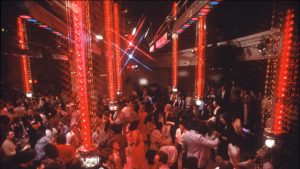
Classic Clubs
At the moment, most clubs worldwide are being forced to keep their doors closed while the pandemic rolls on. We can only hope and pray that as many as possible are able to get through this and re-open in the near future. Clubs are central to DJ culture, and these 7 classic clubs are some of the best from around the world, and through history.
Studio 54 (New York)
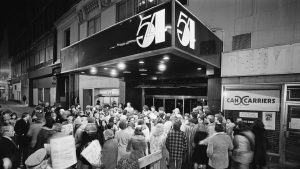
The legendary disco club, Studio 54 was the heart of glamour during the late 1970s. It has gone down in history for its crazy tales of famous guests, excess (including open drug use) and strict door policy (if you wanted to get in, you had better be OK with standing in line and being judged harshly for what you looked like!). Nile Rodgers (the co-founder of Chic) tells some incredible stories about the place he considered his spiritual home – but one of the funniest led to his smash hit “Le Freak“.
Along with the other founder of Chic, Bernard Edwards, he had been invited by Grace Jones to a show at Studio 54. But she had failed to let the famously rude door staff know, and they turned Rodgers and Edwards away. They went back to their studio to jam, and ended up writing the famous riff of Le Freak, with slightly different words, aimed at the Studio 54 door team. “Aaaaaaaahh… Fuck off!” They realised they had a hit on their hands, changed the words to “Freak out!”, and the song went on to sell over 7 million units, and become the biggest selling 7 inch record in the history of Atlantic Records!
The Latin Quarter (New York)
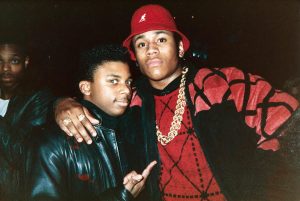
Hip-hop didn’t really start in a club, but by the late-80s, The Latin Quarter was famous for the incredible rappers and DJs who passed through its doors. Legends like Ice-T and Slick Rick name-checked it in songs, and anyone who was anyone in hip-hop knew about it.
But the famous rivalries and tensions that have often plagued the scene caused problems – there are countless tales of fights, stabbings and shootings at the venue, and eventually it changed its name to The Penguin Club.
There are some seriously juicy stories about The Latin Quarter in this episode of Questlove Supreme, with Boogie Down Productions member D-Nice. And this book is an oral and pictorial history of the famous venue.
The Warehouse (Chicago)
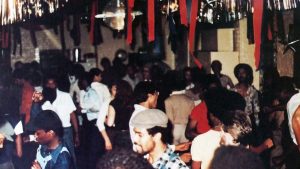
While The Warehouse opened in the same year as Studio 54, 1977, it ended up taking a very different path, largely thanks to its first musical director – house legend Frankie Knuckles. As you may have guessed, this place is now looked back on as being the birthplace of house music.
The club started out playing R&B & disco, experimenting with ways to develop an original blend of these with European electronic music. The venue was primarily frequented by gay black and latino men, and charged a $4 entry fee, but then only served free soft drinks within.
Knuckles evolved the sound over his time at The Warehouse until what we can now recognise as house, electronic beats from a drum machine a core component of this, came to be.
The Haçienda (Manchester)
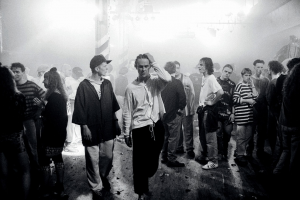
No list of classic clubs would be complete with the oddity that is The Haçienda. Largely funded by the record sales of New Order, this club rarely turned a profit, usually made massive losses, was basically empty for its first few years, and more or less run by gangsters for its final few – but it helped change the course of music and DJing along the way. They were at the centre of the 2nd summer of love, and the explosion of rave culture in the UK in the late 80s & early 90s.
How Not To Run A Club, by New Order bass player Peter Hook, is a fascinating, and often hilarious, retelling of his experiences with The Haçienda. One memorable tale involves a new year’s eve where they were taking so much cash that the safe became full, so they started stashing the money behind a barrier. At the end of the shift they went to fetch the money and only found a pile of ashes – indoor fireworks that had gone off at midnight had sent sparks over the barrier and torched most of the night’s takings…
Berghain (Berlin)

Arguably the best techno club in the world right now is Berghain, a former power plant i. Part of this is driven by the air of mystery around the place. Hours queuing to get in, if you can get past their famously picky doorman Sven Marquadt. Phones strictly forbidden, so only a few tiny snippets of footage exist of the interior of the club (although somebody went to the effort of creating a replica in Minecraft!).
The club is notoriously hedonistic, with people openly engaging in sexual acts, and dark rooms provided specifically for this purpose. It emerged from an exclusively gay event, Snax, but the huge global fame of the music aspect of the club means that the crowd is more mixed now. For many underground DJs, playing at Berghain (which includes Panorama Bar) is a big career goal. The club stays open all weekend, right through to late on Friday night – once you have a stamp you can leave to get some rest, and come back to keep on raving on Sunday morning if you want!
Space (Ibiza)
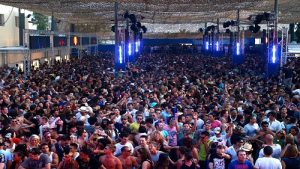
Ibiza is awash with legendary nightclubs, but my favourite is one that sadly no longer exists (although rumours abound that Carl Cox is going to resurrect it!).
The winner of “Best Global Club” multiple times at the International Dance Music Awards, Space was open from 1986 to 2016, and was at the heart of Ibiza’s growth to a globally renowned party destination. Famous for its open-air terrace, and the sound of planes roaring overheard during the late-night/early morning sets, this is one of the definitive clubs on the island, a 5000-capacity fun palace. Their legendary Sunday party “We Love…” hosted everyone from Chemical Brothers to Disclosure to David Guetta.
Ministry Of Sound (London)

Ministry of Sound is one of the longest running fixtures in nightlife, opening its doors in 1991, and has spawned one of the biggest independent record labels in the world. Almost everyone you could imagine has played here, across almost any genre you could name. They are best known as one of the world centres of house music – with legends like Armand Van Helden and Calvin Harris appearing in the main room (known as The Box), which has one of the best sound systems in the world – fully devoted to the music and the dancers, with bars provided elsewhere in the venue. Hip-Hop and R&B are catered for by their midweek night, Milkshake, which has hosted the likes of Drake, Tory Lanez & Roddy Ricch.
Get yourself ready for the return of the clubs by heading over to the Heavy Hits pool for all the best new tracks!

Joel Corry x Heavy Hits #HEADNHEARTDJCHALLENGE
Heavy Hits & Atlantic Records have joined forces to host a DJ Challenge for Joel Corry and his smash record “Head & Heart” feat. MNEK. DJs from around the world are welcome to enter the “Head & Heart DJ Challenge” for a chance to win $1000 and an annual subscription to Heavy Hits Record Pool.
Need some inspiration? Check out this amazing routine our very own DJ AndOne put together ☝️
Prizes
- Grand Prize: $1000 and an annual subscription to Heavy Hits Record Pool.
- 2nd Place: $500 and an 6 month subscription to Heavy Hits Record Pool.
- 3rd Place: $100 and an 3 month subscription to Heavy Hits Record Pool.
- 4th/5th Place: 1 month subscription to Heavy Hits Record Pool.
How to Enter
- 1. Record a (60 second or less) video routine of yourself DJing using all three of Joel Corry’s hit singles “Head & Heart”, “Lonely”, and “Sorry”. You’re free to use the original and remixes of the records in your routines.
- 2. Upload your video routine to Instagram and make sure to use the hashtag #HEADNHEARTDJCHALLENGE as well as tag @heavyhitspool and @joelcorry in your Instagram post.
Rules
Contest is open to participants worldwide (no purchase necessary necessary to enter). All videos must be submitted before September 30th at 11:59pm EST and will be judged by the Heavy Hits crew based on creativity, charisma, technical skill, and originality along with consideration from follower feedback (comments, likes, etc). The top submissions will be announced on October 5th. Winner will be chosen by Joel Corry himself and be announced later that week.
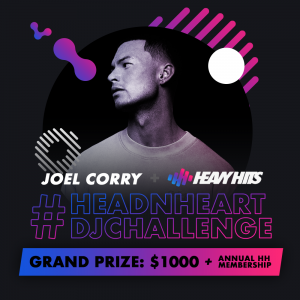
DJ Etiquette
Etiquette is a word many people associate with stuffy dinner parties and posh restaurants. But every corner of life has some sort of “rules”, best practices to avoid offending or upsetting people, and to make a good impression of yourself. Understanding them can help you avoid looking foolish in front of promoters and fellow DJs, and increase your chances of repeat bookings.
First things first – these are not hard, fixed rules. And there may well be regional differences that I’m not aware of. But, based on my 20+ years of DJing around the world, these guidelines to your behaviour should help you make the right impression! These are based around club bookings – wedding & function DJs, for instance, have a very different set of circumstances to consider.
Turn up on time
I never cease to be amazed by how many DJs cannot turn up on time. We have one of the best jobs going. At any given event there are dozens, maybe hundreds, of people who would like to take our job. Its our hobby – and we are getting paid for it! Why on earth would you be late to that? Something you don’t want to do – sure. But playing music to people for money? What is making you want to miss the beginning of that?
Being late is going to annoy the people who booked you, and possibly the DJ you are replacing on the decks, if they’ve got somewhere they need to get to. Busy DJs often have multiple sets in one night, and might need to keep a very strict timetable – if you are holding them up from getting to their next gig, you’ve annoyed your booker, that DJ, and then they will go to the next venue and blame you for why they are late!
To compound things, a lot of DJs think – “Ah, I’m supposed to be on at 10pm. It’s 10.10pm. I’d better text them to tell them I’m running late”. Errrrr… I think its safe to say that this isn’t especially helpful. If you think you might be running late, let them know as soon as you realise it is a possibility. Give them plenty of warning so they can tell the DJ that is on (they can then pace their set appropriately, or make arrangements if they are in a rush to get a subsequent gig), and then if you manage to turn up on time you’ve flipped it, so it seems like a positive that you’ve done the single easiest thing in the entire universe.
Check out the end of the DJ’s set before you
Even better than simply turning up on time is to to turn up a little bit of time before your set starts. This gives you the chance to say hello to the DJ on before you if you are taking over, or time to make sure the DJ booth is set up right for when you start (NEVER assume that everything will be perfect when you arrive!). Have a walk around the venue. Listen to the sound, any louder or quieter areas, check out the clientele, try to get a sense of what they will be into.
If there is a DJ already on ahead of you, notice what they are playing. If they are up for it, you could even ask to look at their play history. It is amazing how many times I’ve had a DJ turn up a minute or two before they are due on, hurriedly put a USB in, and proceed to open with a song I played about 5 minutes before. Sure, that opening song does go great with my last song… that’s kind of how this song came to be on… And I will admit to having done the same myself; quickly got a song playing, only to have the DJ say “Oh, I just played this”, with lots of confused looks from the dancefloor. VERY embarrassing.
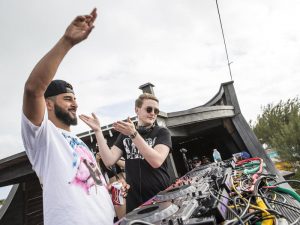
Ask how they want to do the changeover
So you’re in the booth, the DJ before you is killing it, and your set time is approaching. Generally there’s a “one or two more?” conversation a few minutes before. When it gets to their last song – its not a bad idea to ask if they want you to let the song play out a bit, as DJs often make their last song something a bit special which they think deserves hearing in full.
This etiquette cuts both ways. If you are scheduled to finish at 1am, don’t stick an epic 9-minute remix on at 12.59am and demand they play it in full!
Depending on the situation, you might want to fade the music down or let the song play out, and then lead a bit of applause for the DJ before you, then start your set from that point. This used to be pretty unusual, but with the advent of DJing on stages more, and DJs having greater celebrity status, this is now quite common. DJ sets are almost like band sets – they have a very defined beginning and end, and sometimes bear little relation to what came before or comes after.
In some situations it might be better to smoothly mix out of their last song, especially if you are mixing house or techno. Keeping the groove going is far more important in those kinds of situations than at many other parties. Also – this can sometimes lead to impromptu back-to-backs, which can be great fun, and if you are an up-and-coming DJ, playing back-to-back with a big name is a great experience, and can generate some fantastic social media content!
If the headline DJ is there with a fair bit of time before they are on, it might be worth asking “do you have any tempo you want me to leave it at for when you take over?” Generally, I find that DJs just say “do your thing!” and encourage me to express myself without worrying about teeing them up, but it shows consideration to do this, and sometimes they might have a preference.
Understand your role
Are you the warm up DJ? Are you the headline set? What is the promoter or venue looking for from you? What sort of crowd has come along tonight? When does the night normally peak? How much of the event is left after you finish your set?
There’s a whole heap of questions you should try to know the answers of when you get on the decks. That’s not to say that you should bombard whoever booked you with all of them directly – which could risk making you look nervous or amateurish. A few key questions here and there is fine, but it is often better to try and get the answers you seek in a more oblique way, either from observation, from asking open-ended questions, or from looking things up online ahead of time.
If you are the warm up, play the appropriate style set – and the key here is to understand what the party and the person paying you wants. Some places want you to do the traditional “slow and steady, build the atmosphere” type sets. Other events, they want it high octane from the moment the doors open. If there is a big producer/DJ on after you – don’t run through their tracks and remixes!
Is your job actually more about soundtracking a vibe, rather than getting the place hype? Smashing out massive festival bangers at a restaurant gig might not be the best approach!
Look the part
I can understand the mindset that it should solely be about the music you play. I used to fully subscribe to it. But the reality is that presentation matters. At some gigs, having a DJ on is an aesthetic choice as much as it is about the music you play – think of sets at malls/shops, restaurants, fashion shows.
By all means, interpret this your own way. Different scenes and different regions will have their own styles to reflect. There’s a balancing act to be found between standing out and fitting into the look of wherever you are. When I do corporate and private shows, I make sure to find out if its a smart or casual affair. I then pick an outfit out that fits that – but make sure that it is distinctive enough that when I walk in, the event organiser can probably work out that I’m the DJ! Ultimately, we DJs are performers. Embracing that side of things makes total sense. Use your own judgement though – some underground scenes can be a bit snobby about people dressing in ways outside the norm! Good luck finding any men in a techno gig DJ booth that aren’t in a baggy black t-shirt!
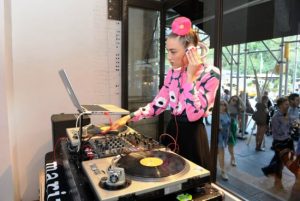
Be friendly, be helpful
A smile and helping someone can go a long way. DJing is actually sometimes a surprisingly solitary endeavour – all those people out having a party, and the DJ there, but separate, their head necessarily in a different space. Striking up a good rapport with other DJs is a great way to help with that, and then when you bump into each other in another city there’s a kind of “old buddies” camaraderie you develop with DJs you’ve played with before, even if you’ve actually not spoken to each other that much.
If you want to make positive memories, one incredibly handy thing I once did, and which I now just do as routine… headphone adaptors. For some reason, DJs are forever losing them. It is crazy really, but its definitely a thing. Well, you can buy them for almost nothing on Amazon – maybe a buck or two. Certainly a lot cheaper than a drink. Every so often I buy a load, and then by the end of the year I’ve saved a load of DJs necks. They are eternally grateful, I’ve helped out the night and the other DJ, and everyone thinks I’m a total hero. Sounds insane, but there you go!
But as a general point – see other DJs as your colleagues, not your rivals. You are on the same team, and the goal is to give the audience a good night. Achieve that, and your career will look after itself.
Be VERY wary of loose trash talk, even if you think another DJ sucks. For a start, you never know who they are friends with in the club, and you might end up saying the wrong thing to the wrong person, and losing a connect. I love this old joke – “How many DJs does it take to change a lightbulb? 10 – 1 to change it, 9 to stand around saying they would have changed it better.” We have a reputation for thinking we are great and nobody can do it like we can… Do you really want to live up to a negative stereotype?
Equipment
Don’t leave this to chance. Don’t make assumptions. Find out what they have, and let them know what you prefer to use. It may or may not be possible for your preference to be set up – if that is the case, make yourself familiar with what you will have waiting for you (YouTube will be full of info about any unfamiliar equipment). If you want to bring a controller to plug in, run that by the club – first off, they might simply not want you to (as most people tend to just stick the controller on top of a Nexus set up worth $6000-7000). Using thousands of pounds worth of delicate DJ equipment as a table is not ideal… So, maybe they can make space, maybe they can arrange to have stuff moved for during your set.
If your preference is to use vinyl and Serato, they need to know. Likewise if you prefer CDJs and don’t bring needles/serato vinyl, let the venue know ahead of time – I’ve had that happen before, turned up to a gig and they had assumed that because I scratch I would want Technics installed!
And treat the equipment as if it is your own. For god’s sake don’t put drinks on them, and don’t wave drinks around over them! Accidents can and will happen, and it is very easy to simply avoid creating the situations where they are most likely.
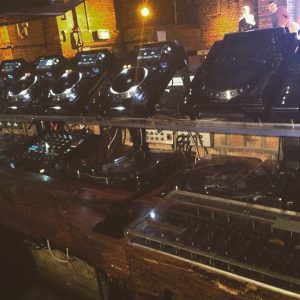
Guest list
This can be a weirdly awkward thing. It is customary for a DJ to get a few guest list spots, and maybe even some drinks tokens for their guests. But it is a good idea to clear up exactly what the deal is when you confirm the booking. Bigger venues DEFINITELY appreciate having the guest list confirmed well in advance – when I was resident at Ministry of Sound, they asked for all guest list names for Saturday night to arrive by 5pm Friday, so that the office could process the requests. Sometimes I could get late people on the list – sometimes I couldn’t, it depended on the circumstances.
If you are on an early set, the promoter may well be happy for you to have 40 people free on the guest list, if it means a busy dancefloor from the moment the doors open. Its more likely that they will offer you some free, and some on a discounted paying list.
Find out the protocol to get in on the guest list – relay that information to your guests. Make sure any mates who aren’t on the guest list understand that they aren’t, as it is not a good look to have a load of people arguing at the front door with security and club staff, your name on their lips!
If your friends are joining you in the booth, make sure they are respectful of the space, and anybody else in the DJ booth. In particular, make sure they understand not to wave drinks around the equipment, touch any of the kit, and let the DJ do their thing!
Drinks
Similar to guest list, this minor detail can get tricky if you aren’t on top of it. Find out if you get a drinks rider, and if so what it is – some places will give you tokens, other places a tab of a certain amount over the bar. If the latter, be careful – they might not cap it when you reach your limit, and then you end up getting a bill at the end of the night. Being drunk, then surprised with a bill for drinks after you’ve just been performing can create some awkward stand-offs, I’ve seen them get pretty heated!
It might be that you get your drinks brought to you in the booth in an ice bucket – maybe vodka and mixers, or a load of beer bottles. This is great – until random people start drinking your drinks. Annoying right? Well, imagine that you turn up and you or your guests start drinking the other DJ’s booze. Great way to make a bad impression!
All this free booze though, fantastic! Well – yeah, kinda. But having a litre of vodka in the booth carries some pretty obvious risks! I’ve got into some terrible states in the DJ booth. Usually its been fine – maybe my mixing was a bit sloppy, I looked a bit dishevelled, but nothing too bad happened. Other times… yikes! The low point would be that time when I literally put my headphones down at the peak time of a set and staggered out of the DJ booth, out the fire escape, and somehow made my way home. To this day I have no memory of any of that!

Don’t add to the problem pile
I like to think that most of the above is pretty common sense stuff really. I’ve broken many of the “rules’ I have talked about above, and seen most of them broken every month, every year of my career. One thing won’t end your life as a DJ – but you can really help yourself by being easy to work with, and a pleasure to be around.
Ultimately, much of it boils down to good, clear communication. Getting details worked out before the music is deafening and the lights are flashing! And in my experience, being reliable, professional, friendly and competent goes a really long way.
Every job exists to solve a problem. The more complex and responsible a job, the more problems they have to solve. When a venue books a DJ, they are solving the problem of entertainment. They want someone to come in there, play music, and entertain their clientele. DON’T ADD TO THE PROBLEM PILE!
If you show up to play your set and immediately start throwing your weight around and making more problems for the promoter, the manager, the owner, the other DJS… thats not going to fly unless your name is worth a lot of ticket sales!
You want to show up, do your thing to the best of your ability, make friends with the people you cross paths with, establish a rapport with the people who booked you, and the audience on the night.
Do the right things and be a bad-ass DJ, and you have a decent chance of making progress when we properly get back to clubbing. While we are waiting for normality to return, go get the hottest tracks over at the Heavy Hits Pool, and follow me over on Instagram.

DJ Tech News – Sept 2020!
Every so often I cast my eye around to find the latest news in the world of DJ technology and bring it to the Heavy Hits crew in a nice neat package. Here’s what is going on lately…
Serato Gets A Major Update
Serato 2.4 Beta is out now, you can pick it up here. To my eyes, the most exciting features are the addition of “make audio available to other applications” in the settings – meaning that you can select Serato as an input for livestreaming software like OBS. You can also now use laptop speakers as master out, bypassing your soundcard, which is handy when on the move without speakers. It also introduces more streaming options to add to the Tidal service that has been in place for a while, and advanced MIDI mapping.
Pioneer Tease CDJ3000
Its been a while since Pioneer took a great leap forward – they’e had some dope controllers and mixers, but everyone has been very curious about what is coming in terms of an update to the club standard CDJ2000 and DJM900 units. Well, Pioneer put out these very cryptic short video – not a whole lot given away (although it looks like they are stress-testing those cue buttons plenty!), but you can bet that they will be serious pieces of kit!
View this post on Instagram
Technics and Red Bull collaborate on a limited edition SL-1210MK7 Turntable
For those of you still addicted to vinyl (or just preferring the feel of vinyl with Serato), Technics are putting out a limited run of 1000 of these decks – made in collaboration with Red Bull to celebrate their BC One breakdancing contest. They feature several unique cosmetic customisations, but are basically the same old decks – which is no bad thing, because they are fantastic record players. They’re not cheap though – £899 each! Check them out here.
Neural Mix Come To Mac OS
Previously only available on iOS, this amazing software is now available for Mac users. We’ve mentioned this incredible software on the blog before – it has the potential to be an incredible creative tool for DJs if it becomes a feature in mainstream software.
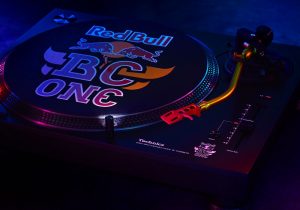
Livestreaming with DJ Transit
The latest Heavy Hits Podcast has been put together by the awesome DJ Transit – you may already know him from his excellent edits in the record pool. I caught up with him to find out a little bit more about him, and especially the livestreaming he’s been doing this year!
First off, can you tell the readers a little bit your background and career so far?
I’m a Philly-based, open-format DJ who started at the age of 14 years old. I spin at local bars and nightclubs as well as private events like weddings and bar/bat mitzvahs. DJing started as a hobby and way of making some additional income during high school. I saw a chance to DJ my grade school dances and from there, it became a passion and career. Currently, I’m one of the talented editors for Heavy Hits as well as a partner in several businesses including a “multi-op” entertainment company called Limelight Event Group.
You’ve just done a new mix for Heavy Hits, what sound have you gone for, and what were your reasons? Did the global lockdown situation influence your choices, and if so, how?
My new mix for Heavy Hits is a little bit of everything and include my edits that are available on the record pool. I also made sure I mixed in the Soulection/Future Beats tracks which I have been really into. The quarantine has definitely influenced this mix because this isn’t the typical party rock set I would normally do at a club. It’s more aligned with that I would I would play as an opening set with feel good grooves. Gotta love them vibes!

You’ve been a pretty early adopter of livestreaming DJ sets, with your Twitch –
Appreciate it! I’ve put in a lot of time and work in making the visuals on my Twitch different than everyone else. I studied other DJs like Heavy and Apollo XO from Chicago and Aiden Scott from Philly for like a week straight. I took some elements from them along with a lot of research with OBS and equipment needed to put it all together.
Has DJing online, rather than in venues, changed the sort of sets/genres you play?
Yes, definitely. I get to play whatever I want and what I’m feeling instead of trying to please a whole crowd. There’s literally no one in front of me so the only responses I’m getting are people who are chatting. I take requests here and there but my viewers usually leave it up to me to do me, which I love.
Can you give a quick run through of your streaming set-up – software, and hardware?
I could do a whole YouTube tutorial video of everything, but here’s the simplified version of it
For video, I have my DJ laptop, a 2013 15″ Macbook Pro running Serato DJ Pro and MixEmergency for music videos with HDMI going out to one of the channels of my Roland V-02HD video mixer. I also have set up my Fujifilm X-T3 mirrorless camera to the other channel. The main HDMI program out of that video mixer is ran into a Elgato HD 60s+ capture card, which is USB connected to my streaming laptop (2015 15″ Macbook Pro). For audio, I spin on (2) Technics 1200s and a Pioneer DJM-S9 Mixer with my main outputs connected XLR to a Zoom H4N audio recorder, which is then USB connected to my streaming laptop. I have all of my different overlays and scenes built in OBS that I stream to Twitch. My streaming laptop is Ethernet connected to my router for stable internet upload speed.
There seems to be a bit of a gig ecosystem emerging online for those DJs who get streaming right – what have your experiences been with this, and what sort of gigs have you been getting?
I think DJs who make the switch to Twitch definitely have felt the benefits that streaming live to Facebook and/or Instagram. The biggest gain is there’s no audio interruptions. You won’t be taken down for playing copyrighted music. It’s only after the fact, that Twitch mutes certain parts of your past broadcasts. Another benefit to Twitch is seeing all of your favorite DJs you couldn’t see spin because you had to work or you’re in a different city/country. You’re also able to discover new dope DJs from around the world!
I haven’t necessarily received gigs from Twitch directly but it has helped me and my company provide virtual zoom parties to our clients. We have made lemonade out of lemons during this pandemic. We were contacted about doing one towards the end of April and it has skyrocketed ever since for us. We currently have 23 virtual events coming up!

Do you have any hints or tips for other DJs looking to get into live-streaming sets?
My biggest advice is to check out other DJs on Twitch who are your friends or you look up to and see what/how they stream. It doesn’t take too much to get up and running. I think if you have some sort of graphic visual overlay with a camera of you and your setup, that’s all that’s needed! Another big tip is to get your audio sounding crispy. I can’t stress that enough. Grabbing audio from the mic off your laptop just sounds terrible. You also don’t have to tell people to throw their hands up in the air or anything like that. I think people tune in more if you’re “interactive” and engaging with the viewers.
Nobody really knows quite what the next few years will look like, or when clubs will be open properly again – but what differences do you think there might be after this enforced period of change?
I think it could go two ways. The clubs will be jam packed because people are itching to be out or it could be a slow start with certain people waiting for COVID-19 to be completely “done.” I have already seen with clear acrylic frames and borders being made so it wouldn’t surprise me if those would be put all around the bar and DJ booth. I also think you’ll see people wear masks out even if the restrictions are lifted.
Do you have anything else you’d like to tell us about?
During this time, I believe as a DJ, you should be working on something whether it’s making edits, organizing crates, downloading new music on the regular or live streaming. It’s important to stay relevant and working on your craft because this time will pass over. Others will notice the work you put in and you won’t be left behind. If you’re doing this full-time, treat it like any other business. There’s always room for growth and improvement on your skills. If you don’t already have it, subscribe to Heavy Hits Pool!
The Ups And Downs Of Running Your Own Events
We’ve spoken with Rob Pursey on these pages before, in an interview covering his career to date. A huge part of that career is built on his choice to run his own events – something that can be a huge benefit to DJs, but which many are nervous to attempt.
I linked up with him to get some pointers on the ups and downs of running his own parties!
How did you first get into running your own events?
It very much happened by accident. I’d been a part of events as a DJ and been involved to a certain extent, but had always taken a more back seat role. We then started our music blog Southern Hospitality and a lot of our events grew out of that and the desire to play music that wasn’t being represented in London clubs at the time. It’s hard to imagine a Hip Hop/R&B club scene that doesn’t play majority ATL rap etc now – but back then we were the only people doing it.
You run multiple club nights – how do you go about balancing those? Are you careful to keep them stylistically separate and spread across various venues, or do things overlap?
Yes that’s crucial and something I’m super conscious about and make a point of trying to match the club event to the venue. For example an event like Players Ball needs that low underground, communal atmosphere it can’t be a table-service affair because we need people to wile out and have fun! Then other events like Rated R, which is an R&B event can be a little more chilled for most of the night and to use an old school phrase can stay ‘bubblin’ for longer, as it’s more about just enjoying the full tunes and not running through records so fast. Hip Hop Karaoke is kind of where everything overlaps, because as well as the performers we have a club night built around it and depending on the crowd that can be an impromptu Players Ball style session, or a more throwback affair – that’s definitely more of a call on the night!
DJing is a pretty precarious job in itself, but running nights takes the risk/reward equation to the next level – what advice do you have for people starting out with events? How do you manage the stresses of risking money – I found it hard to deal with the reality of putting events on that ended up losing money or barely breaking even! And when things are going well, are there things people can do to avoid getting carried away?
Without sounding boring, it really is a case of not getting too gassed. You sell out a few events and make good money and it’s easy to think it will just roll like that forever, but without attention to detail it won’t. I think to start with just put something on that you fully believe in and have a passion for, because that will be communicated to the customer and will more likely encourage loyalty to your event. Losing money can definitely be avoided if you don’t overstretch yourself and just be real about what you’re trying to achieve and slow growth is still growth! The stress is definitely always there in the run up to events, especially ones that aren’t looking as promising as others, but if you just channel that into some sort of action – extra promo – then generally it both de-stresses and adds on to the event itself.
For a typical club event you put on, how many people are involved – from promotion through to the actual night? If it varies, what are the benefits and drawbacks either way?
I run a pretty small team for my events and for larger events bring more people in. On a typical club night it will be myself and a couple of others on the promo, a designer (who does the majority of my artwork) and then door staff and occasionally some street promo staff. The benefits of a small team are obviously larger dividends when the night goes well, but equally I’ve been slightly burnt by cutting a corner and realised I could have made a bit more money or had a busier event with a little help. So it really is a balance.
How important these days is traditional, old fashioned promotion like posters, flyers and word of mouth vs the use of social media?
I think word of mouth is still greater than everything. If people have a banging night, they will come back and bring people. I feel like posters, flyers etc are definitely outdated however when used on the night they can definitely scoop up a few extra people and sometimes just having that visual presence on the streets does sink in subconsciously with people. However in saying all of that, it’s definitely largely social media these days.
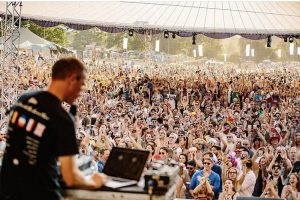
How did you end up getting your brand Hip Hop Karaoke on to the festival circuit? Was that something you pursued, or did festivals come to you?
Festivals came to us initially and then it’s really just rolled on from there. We now have good relationships with a lot of the larger festivals and return each year as well as making an effort to play new festivals that arrive. It wasn’t even something I thought about originally but once we did a few it quickly became the favourite part of my job.
One of the common issues for successful promoters is people biting their ideas – you’ve been ahead of the curve on a few things, so how did you react to others following your ideas?
Yeah I’ve definitely been bitten more than a few times ha ha! I won’t mention any names, but I just have to mentally keep it moving and just try and do my event/s to the best of my ability otherwise you end up chasing negative energy. I definitely try my very best not to do it myself however, even unwittingly as I feel we have to respect each other out here. Generally the original promoters last longer and the biters make a quick buck but don’t know where to go next after that one runs its course.
How important are things like the name and artwork of a night?
Crucial. A good name of an event at the right time can really capture the imagination and mood of people and seem like the essential place to go. Equally with the artwork, it has to signify something to the audience you’re trying to attract, whether that’s a key artist, or some sort of design texture. It needs to be authentic.

How do you go about building up and sustaining a following and community around a club night?
Pretty much as I mentioned before, by paying attention to how the night is going and making sure the musical programming isn’t predictable and generic. I also make an effort to be at the door and amongst the people at my events and build relationships with my crowd old school style. People then begin to trust you when you launch new events. It’s not contrived however as that’s just how I am – I like people! The community part is super important to me and if you have that then you’re halfway there to putting on great events as your crowd will do the promotion for you.
If you could go back in time and give yourself one piece of advice before you started putting parties on, what would it be?
I would definitely train people up to run an event in my own image then I could take a few more nights off! Team is everything and I definitely left a lot to chance in the early days and just gave myself too many jobs!
What did you do during lockdown to maintain your events and brands and keep connected with your communities?
With Hip Hop Karaoke we did ‘Quaraoke‘ which was so much fun and I actually found we got people who couldn’t always get to the events performing online which was super satisfying. Also just posting stuff of relevance and keeping the aesthetic and energy of the events online as much as possible.
What have you got going on at the moment, and the coming months?
Well, as things are (slowly) changing, we’re gearing up for our first post quarantine events, which may be a slightly pared down version, but will be great to get back nonetheless! In the meantime I’ve been keeping my hand in by doing some sets online and some at larger open spaces like Boxpark Croydon, so I’m not totally rusty!

What’s The First Track On Deck When We Bars & Clubs Open Back Up?
The brilliant Heavy Hits instagram channel asked our community this question, and we got a great selection of replies from the DJs there!
Its a question that a lot of us have been asking ourselves, and so here’s the highlights from the post, to spark some ideas for your sets!
DJ edit legend Isaac Jordan was quick off the draw with a brilliant suggestion – Scarface and Jay-Z – Guess Who’s Back.
Former interviewee DJ Gravity One took a cheeky look at it with his suggestion Deborah Cox – Nobody’s Supposed To Be Here! Not exactly a club banger, but might be suitable for some of the illegal raves happening right now!
DJ J Sizzle went for a classic with the right sentiment – Ma$e – Welcome Back. While DJ King JB focused on what we’ll be leaving behind, with Future – Mask Off!
No messing from DJ Raize – he is all about that new heat, WAP!
While DJ AndOne goes in slick and smooth, suggesting T-Pain – Buy U A Drank
My choice – its a new-ish song, with an old skool feel, DJ Format & Abdominal – We’re Back.
View this post on Instagram
Follow the Heavy Hits insta to keep up with all the best memes and DJ conversations, and head over to the Heavy Hits pool to snag the tracks you need to be ready for when you are back playing to dancefloors!
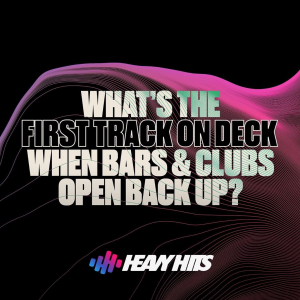
Tech News!
For obvious reasons, it has been a relatively quiet year for new tech, and it looks like this trend is set to continue for some time…
NAMM 2021 has officially been cancelled, to be replaced by a Believe in Music virtual event. The music trade event was originally scheduled for the week of Jan 18 2021, but with the ongoing Covid-19 pandemic, it isn’t really a huge surprise to see a decision like this reached. Organisers cited the health & safety of NAMM members being a top priority.
NAMM President and CEO Joe Lamond said “While it remains unsafe for us to gather in person in January, Believe in Music week will use new, intuitive technology to connect us all to harness the incredible energy that happens when we come together.”
Companies obviously already have the difficulties of supply chain and workforce disruption to cope with, and now that one of the marquee events of the calendar is not happening, the urgency to have products ready to display there may diminish.
Its not all bad news though – Rane just launched the 72 mk2 and Twelve mk2, updates to their exceptional mixer and digital decks. They fix a few issues from the previous versions (notably on the mixer, adding an external crossfader tension adjust, a baffling omission from the original!) and introduce a host of new and improved features. The Twelve Mk2s now generate control tone for Traktor and Virtual DJ. For a full review, check out this great piece here.
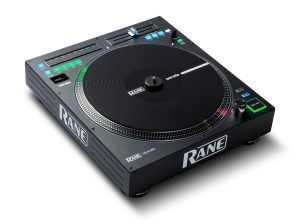
Over at Native Instruments, the company behind the Traktor DJ software, they have just announced that Constantin Koehncke is to become their new CEO, while Robert Linke will be Chief Product Officer & President – both are internal promotions, with the people they are replacing remaining with the company. The statement from the company demonstrates their confidence moving forward – “Native Instruments today is in a very strong place and it’s on this foundation that Constantin and Robert will bring fresh energy, continuing to deliver exceptional products. Their many years of leadership in Marketing and Products and countless successful contributions made them the perfect choice to lead Native Instruments into the future.”
As one of the most innovative DJ and music tech companies in the world, it will be interesting to see what they have in store in the coming years! In the here and now, Traktor Pro 3.4 beta has just introduced the addition of a smart playlists feature.
As always, go get the latest hot tracks from the Heavy Hits pool, and follow me on Instagram!

How to deal with requesters!
If there is one thing that unites DJs, it is that we have all, at some point, had to deal with super-drunk people asking for songs. How we handle these moments can really change the way we experience a night, and so it is a good idea to have some strategies and techniques for dealing with them.
Of course, there is no right way, and no wrong way, of handling this. Its a personal choice, and often depends a lot on the sort of party you are spinning at, the sort of crowd, and a million other variables.
But, with that said, he are some ideas that I have settled on from over 2 decades of DJing all over the world, from clubs like Ministry of Sound and fabric, through to weddings and corporate Christmas parties! Hopefully they will help some of you when this pandemic is finally over, and everyone is back to partying every weekend!
ALWAYS BE POLITE
No matter what, try to keep your cool. Drunk people will often say things in a very blunt way, often not realising that they have accidentally insulted you. Or they might be insulting you very deliberately. That doesn’t matter – ALWAYS keep the moral high ground, always stay calm, do not get angry, do not get into an argument. There is zero benefit to you if you do this, and if you let it get personal, you massively increase the chances that they will complain to management or leave a bad review of a venue.
Of course, this is easier said than done. Drunk customers screaming in your ear while you try to mix can be extremely annoying.
If you can, try to create simple, firm boundaries – politely let them know that you’ll be with them once you’ve done the mix you’re in (I generally hold a “with you in 1 minute” finger gesture up – no, not that finger gesture…). What is hilarious here is how often they get bored within maybe 20-30 seconds and just wander off back to their friends, usually just as I’m finishing up my mix. Don’t let them come into the DJ booth. Definitely don’t let them hold drinks ANYWHERE near the decks, and especially not in the airspace over them – drunk people spill drinks ALL THE TIME! If you can make sure a member of the security team is by the DJ booth to act as a firewall, even better!
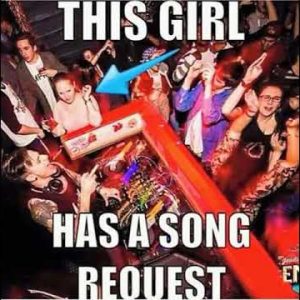
HAVE FUN WITH IT
There’s a suite of standard DJ requests that every long-time DJ has heard a million times. Some of these used to really get under my skin. But over time, I’ve learnt that it is far better to have a bit of fun in those moments.
When people say “Can you put something good on?”, a lot of the time they have no idea that they are implicitly saying “because this music isn’t good”. My standard response to that request is this – “I’m afraid not, I’m not allowed to put anything good on. Orders of the management. Only allowed to play really terrible songs, its the house rules. Honestly, it would make my life so much easier if I could put good songs on, but I’m just not able to”. About 80% of people get the joke, and realise how rude they’ve been, and we have a laugh, and its all good. The other 20% are OUTRAGED at this crazy policy, and it is genuinely hilarious to have a conversation with someone that stupid about a concept so ridiculous.
When they as “Can you put on something we can dance to?”, I have a great line I picked up from another DJ friend,- “you start dancing, I’ll mix something in to your dancing”. Usually gets a laugh. I used to point out that if they want to dance to whatever is on, they can, but this line of conversation never got me very far, so I don’t tend to do that now.
When you’ve been playing out for a while, you get to know what are the things that people will say to you a lot, and you can work out the best responses for you and the crowds you play to. And remember – the crowd are your friends, you aren’t trying to be mean, you want to have a laugh with them, not get into a confrontation! They just want a fun night, and you want them to have a fun night – but drunk people in clubs aren’t always the best at expressing themselves!
THE BLANKET YES/NO
These two options are quite popular. The blanket no is a bold strategy, and isn’t something I would tend to advocate for in most situations. Sure – if you are Carl Cox, and people have come to see you specifically, paid $50 a ticket to see what you are going to play, then I think its reasonable that you aren’t expected to field requests. But if you are just the DJ who happens to be on in that venue on that night, and the crowd in there is coming in to the venue (rather than specifically to see you DJ), I would generally say that at least listening to requests goes with the job. Obviously, lots of people have differing views on this, and it all depends on the context.
But with a blanket no, it is very straightforward – no requests, just play what you want, when you want. Some people put signs up or wear ostentatious t-shirts to make the point, but chances are that you’ll still get people trying it on. You just have to stick to your guns and hope that the choices you make keep them happy!
The blanket yes is a lot more sneaky! Basically, they ask for whatever they ask for. You say yes. They go away, you play it or not, whatever, its as if the request never happened. I’d guess that 90% of those requesters never come back to the booth. And old co-host of mine used to swear by this approach (RIP DJ Remy), and always used it. I sometimes say yes to requests, then simply forget to play them – then realise that they never came back to complain. So, it does work.
The big risk here is that you give a yes to something you don’t have or would never play, and they keep coming back persistently – at a certain point you might have to switch that yes to a no, and then deal with the fall-out!
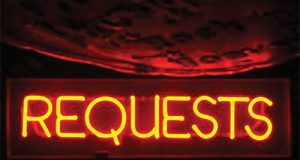
KNOW YOUR ROLE
I’ve alluded to this already. There’s all sorts of DJs, and all sorts of parties. At a cool underground party, or one where you are the special guest that they’ve flown in, specifically to hear YOUR style of DJing – requests are much less of a thing. Chances are you’ll still get a few, but there is much less expectation to play them.
At a wedding? An office party? A late bar drinking/dancing spot on a Friday night with a really mixed, commercial crowd? All of these places and more will be full of people expecting to hear the hot songs from the radio, the classics from their youth, etc etc. In my opinion, it is just part of the job to handle requests at these sorts of gigs, and do so with good grace and humour.
I personally am happy to listen to requests. If its a good song, and fits the party, I’ll say “yes, I’ll try and work it in”, and add the track to my Serato prepare crate. Often a “yes” will be followed with a hopeful “play it next!” – I draw the line at people dictating when and how I mix through styles and genres! I like to play all sorts of music, but I want my sets to make musical sense – so a yes to a request might still mean that they wait for a couple of hours to hear the song.
PRIVATE FUNCTION? DO YOUR HOMEWORK!
One of the best tricks I have learnt for wedding sets is a deceptively simple, and surprisingly important, one. I speak with the bride and groom in advance, and try to get a “Definitely play” and a Definitely do not play” list – with the latter one being the one I emphasise. Usually couples haven’t even considered this, but some songs have painful memories attached, or might be associated with a previous partner. They might have a certain singer who’s voice they hate, or a genre that makes their skin crawl. On their big wedding night, you want to avoid nasty surprises like that!
If I can, I like to get at least 15-20 songs that they REALLY want to hear (and if choices are maybe not very “party” I will double check with them – most couples just want that you make the dance a fun night, and play music they enjoy!), and build the set around that on the night. It gives you a great idea of how to structure things, what will make them happy, and so on.
The “Do not play” list has the benefits outlined above – but also stands you in good stead when the drunk uncle comes over saying “you know what would really set this party off….” and asks for something that you know the happy couple would hate!
Similarly – if you are going to play at a corporate party, try and find out if there are any songs that absolutely mustn’t be played (All hell broke loose when I played a request of Blurred Lines at the Xmas party of one of the big tech firms, and every subsequent party I was instructed in the contract to not play that one song!). Try and find out if they have any tunes which are big for the company, kind of inside jokes or anthems from previous parties – little things like that creating special moments will do wonders for repeat bookings!
For all private functions – check in advance if they want you to play clean versions of songs!
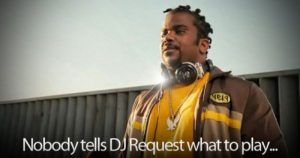
CREATE A HURDLE
If you don’t really want to have to speak to requesters all night, one trick you could try is to make it a bit more difficult.
For example – one thing I have seen is a sign explaining “For requests please do an Instagram story, tag DJ @XXXXX and club @YYYYY, and enter your request on the story”. The club and DJ get a bit of social media content, and most people will simply not be bothered enough to jump through those hoops.
If you are feeling really cheeky (and organised!), maybe set up a premium text service and charge people to text in their requests!
MAKE IT SIMPLE
Or go the other way – get a pen and pad, and let people write their requests down. Upside – you don’t have to talk directly to people, and generally they will wander off after they’ve written their request and waved it around a bit. Downside – party people don’t often write very neatly, and the drunker they get, the bigger and messier the writing gets, until eventually you’ll be lucky to even get one request per page.
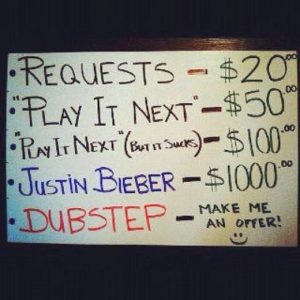
THE “SKIP THIS SONG” PEOPLE
These ones are the worst – and a pretty recent phenomenon. Generally, they stand in the middle of the dancefloor making that sort of throat-slash/cut gesture, or the rolling-hands substitute sign, staring straight at the DJ. Honestly – I think this one is just amazingly narcissistic. I’m usually play long sets, covering dozens of genres and eras. No person in the building is likely to be into every single song I play, and that’s fine! But the idea that “I don’t like this one, skip it!” is an acceptable response while others are having a good time… sheesh…
My response is generally quite petty, but whatever – I basically take my headphones off and make a real show of stepping to the back of the booth, or the edge and chat to a friend, and let that song play to the very, very end. If they’ve done the hand-roll gesture I sometimes pretend to think they mean “play it to the end” and mime the words back with the same hand gesture “play it to the end, sure!” A DJ’s job is literally to put the next song on, and these days most open format DJs rattle through songs rapid-fire. So this one is a particularly stupid form of request, and deserves to be treated as such!
SHAPE YOUR MINDSET
Its very easy to get negative about requests – they can be annoying sometimes! But you have it in your power to flip anything into a positive. If you are getting a steady stream of requesters all night, that means you have plenty of customers in the venue. It means you have a way of hearing about songs you might not have checked out otherwise (even if they turn out to be rubbish!). It means you have endless opportunities to create a good rapport with regulars – which will help you solidify residencies. It means you have a chance to practice your patience with the more difficult ones…. Basically – you’re going to get people coming and talking to you when you DJ, thats a fact of life, so flipping your perspective to think about it positively is a very sensible approach to take.
Its very easy to forget – at a party, the DJ leads. You have to be sensitive to what the crowd wants, but you shouldn’t be following them, they should be coming with you. Often there is a particular type of person who comes and make requests, and often they aren’t the most polite. They’re just the loudest, the one prepared to go and demand what they want. Never feel like you have to change the party just because a handful of loud people are hectoring you – look at the bigger picture. Is the dancefloor full, is the venue busy, are people smiling and having a good time? I’ve been told SO MANY TIMES that I need to change the music, nobody likes what I’m playing, and its like I’m in a parallel universe to these people – I just point at the hundreds of happy people having a great time and make the point “I’m not sure that’s true”
SOMETIMES ITS OK TO BE BLUNT
Occasionally someone just doesn’t get the message. I always try to avoid getting angry with people, or swearing, or anything else like that. But sometimes, you just have to say it like it is, and even then you can dress it up a bit – “Look – I play here every Saturday, and they pay me pretty well. I’m definitely in the right place, they like what I do. Maybe you aren’t in the right place?”, which effectively translates as “I think you should leave”
Sometimes people annoy me to the point where I explain that any song they request I will deliberately not play, even if I was going to before they mentioned it. With incessant requesters, I sometimes stop them and say “OK – this is the last request you can make tonight, after that just enjoy the music with your friends!”

IN CONCLUSION
I’m sure there will be some who disagree with things I’ve written above – these are just my opinions, and some things that work for me. And there isn’t a “correct” way to do this.
You get better at it with experience – I struggled early in my career, and young DJs I’ve mentored have often said that they struggle with requesters, and that it can knock their confidence at times.
There is something lovely about being able to completely make someone’s night simply by putting a song on for them. I’ve had times where I’ve said no to a request, then realised I actually have the song – the look on those peoples’ faces when they recognise their song coming on is so heart-warming! And there are moments of genius from customers occasionally – where you just think “that is brilliant, and perfect!” and put it straight on! And I absolutely love it when people make a request and I can silently point at my screen, because the track they are asking for was already loaded up to come on next, through some psychic connection!
Try to do everything with a smile on your face. If someone says something stupid or rude, don’t let it get you down – make a mental note of it, and you’ve got some fresh content for your social media – I find that people love funny DJ booth stories about this sort of stuff!
But for now, head over to the Heavy Hits pool to load up on the best new music, and check out my Instagram!

Protect Your Ears!
One of the most important things for any working DJ is to protect their hearing, but it is amazing just how many DJs don’t make any attempt at all to do so. This is especially strange when you realise that tinnitus is irreversible – once you damage your hearing, you are stuck with the damage forever (or until some futuristic treatment is invented!).
There are various ways to look after your hearing, at various costs.
One of the best decisions I ever took was to be a pretty early adopter of moulded ear plugs – I got my first set nearly 20 years ago, and in terms of value for money, they were a bargain. The price varies somewhat, but in the UK I have generally paid roughly £125-150 for a pair of moulded earplugs, including the chosen filter. For the kind I got, I found this in the USA – coming in at $185.
The procedure is fairly straightforward, and to my mind, quite a pleasant experience. The ear specialist takes a putty mixture and syringes it straight into your ears, with small piece of foam attached to a piece of string already in there, creating a perfect mould of your inner ear canal, which they can pull out using the string once it sets.

These are sent off to be turned into earplugs of whatever colour you choose – pro tip, pick a colour that you can find easily in a dark DJ booth if you put them down! I usually go for a bright yellow, and they have all sorts of options on a menu. You can also have your name written on the ear plugs, which is handy if you lose things!
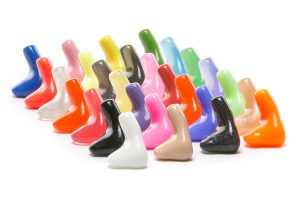
They come with filters of varying strength – I’ve generally favoured 15db filters, as they take enough off to protect my ears, but not so much that it totally kills the experience. But sometimes in certain clubs/festivals you might want more protection, and sometimes at quieter gigs, 15db can be too much. So it can be useful to have different options if your budget stretches to that, and in many moulded ear plugs, the filters can be popped out and swapped around. Watch out for losing them though, as the actual filters are tiny! The main selling point of these is that the volume goes down, but the sound stays broadly the same, as they cut a very even range of frequencies out.
A huge benefit that I have noticed from using ear plugs, beyond the obvious reduction in volume, is the physical protection from people shouting in your ears. This is something most DJs have encountered plenty – drunk patron, or a friend, comes over to say something, leans in, then….. SCREAMS directly into your ear, which is can be genuinely painful, and incredibly harmful to your ears too. The earplugs above act as a physical barrier for the air pressure problem caused by that situation. I also find that it seems easier to have conversations in clubs etc when these are in – so much so that I tend to wear them to gigs, festivals, clubs etc.
I will not lie to you – it is more fun to DJ without them in. It takes a little while to get used to the change, and a first you might find it a bit unsettling, and not be sure about your EQing and volumes. You definitely have to watch out for turning the main speakers and monitor loads louder – cancelling out the benefit of the earplugs, and absolutely ruining the ears of everyone else in the booth or venue! Every so often take the earplugs out and check how things sound while you get used to playing with them in.
But the benefits are huge – you protect your hearing! No more EEEEEEEEEEeeeeeeeee…… whistling noise in your ears when you get back home from a gig! Tinnitus is no joke – my friend Eddy Temple-Morris recommended the place I got my plugs from, and also is an ambassador for a suicide prevention charity. Those two things are more linked than you would expect – plenty of people with bad tinnitus become suicidal, so take this stuff seriously! I highly recommend you Google your local ear specialist and get yourself properly protected. If you are in the UK – check out the Musicians Hearing Health Scheme – an incredible discount on top of the range hearing protection, plus a hearing test.
Cheaper Options
While I would definitely recommend you get the moulded earplugs, and would say that they are the best value for money you will ever spend as a DJ, if you simply can’t afford that, there are cheaper alternatives.
At the very basic level, there are those little foam ones – incredibly cheap, a quick look on Amazon and you can get 60 pairs for $11.99! There’s all sorts of colours and brands. Be aware – while these will reduce the volume somewhat, and provide the physical barrier for shouty people screaming in your ears, these are designed simply to block sound out – maybe for workers, or people trying to sleep better. They are not attenuated to be able to hear music at its best, and you will struggle to get your EQing right with these in!
I have tried out the Flare Isolate earplugs – while some people seem to rate them, I didn’t like them at all myself, as they seemed to just be a more expensive version of the above, blocking out plenty of sound, but flattening my hearing out in a way that made DJing incredibly weird.
Then there are these style plastic ones – quite a lot of companies make versions of these, and when I’ve lost moulded earplugs and had to wait for replacements, these have done a reasonable job as a cheap placeholder.
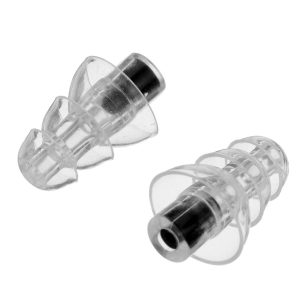
Depending on which ones you get, be careful with your headphones – some of them stick out a fair bit, and so you can end up getting an uncomfortable poke in the ear! They tend to be priced around £10-20, and the sound is acceptable with the ones I’ve used.
Other Tactics
Hearing loss is a funny thing – it can be an accumulation over time, or it can be brought on very suddenly by a single very loud event. Obviously, as DJs, we tend to be in very loud environments a lot.
One thing you might be able to do – if you are in a DJ booth with a proper monitor set-up, only turn the monitor up when you are actually using it (ie, cueing and mixing). Once you are done, turn it back down to zero. Then back up again for the next mix in a minute or two.
There’s a few benefits to this. Firstly, you are limiting your ears’ exposure to the very loudest music it will get. Secondly, it stops you getting too lost in your own little “booth party”, and forces you to think about what it sounds like on the dancefloor, around the venue, and pay more attention to your audience. Third – its likely that you won’t end up with the monitor creeping up and up and up and up! Ears tend to adjust to whatever volume is there, and so to get the same “impact” it is tempting to just keep turning things up, not realising that you are taking it too far. Monitor outputs almost never have an LED read-out to say you are going into the red, and it happens ALL THE TIME – DJs get carried away, and end up with the monitor as loud as it will go!
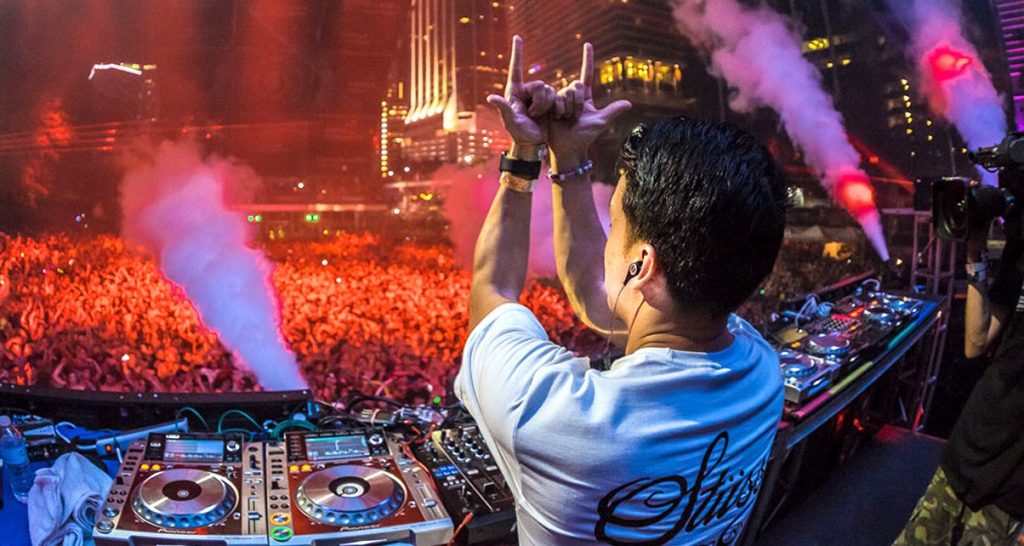
One clever approach that seems to be growing in popularity is in-ear monitoring. With this, people have small in-ear headphones instead of larger over-ear DJ headphones. You can get moulded ones made even, or just use traditional wired in-ear headphones. Then use the cue/master controls to mix, rather than the monitors. This gives the DJ a much more precise sound to work with. The downside many mention is that you can feel a bit disconnected from the audience. But really, once you turn the volume back down, its no more so than with moulded earplugs. It is certainly a tactic worth considering, and completely eliminates the all-too-common problem of bad monitoring setups, or even those situations with no monitor at all!
Hopefully this article will have sparked a few ideas about protecting your ears. In all seriousness – anything is better than nothing. Hearing loss is a horrible thing for anyone to suffer. It is preventable. We are in a business that totally depends on having functioning hearing.
So it is crazy that many DJs will drop a couple of hundred on a pair of flashy sneakers, and then quibble over spending half that on protecting the most important tool they have!
Look after your ears, and protect your hearing!
Get the latest tracks over at the Heavy Hits Pool, and follow me over on Instagram!

